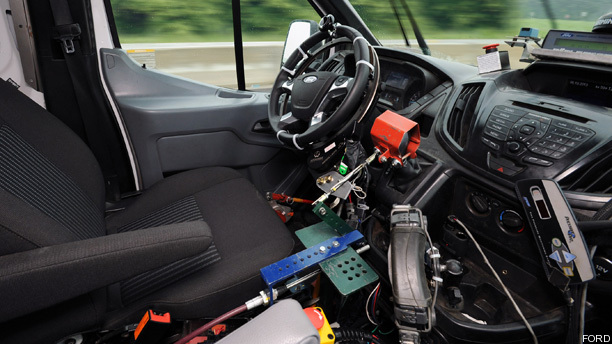Ford Replaces Humans With Robots For Taxing Test Drives

Ford robot testing
Autonomous car programs from the likes of Audi, Toyota and Google have been a popular topic lately. While the technology currently exists for self-driving cars, we are likely years away from seeing them publicly available, due to a complex combination of safety, legal and infrastructure concerns.
Take a trip behind the gates at Ford's Michigan Proving Grounds, however, and it's a different story. Ford announced today that they are the first automaker to use robotic technology to assist in new vehicle durability testing.
"Some of the tests we do on our commercial trucks for North America are so strenuous that we limit the exposure time for human drivers," said Ford's vehicle development operations manger Dave Payne.
Robots piloting cars so that human test drivers can take a break? Not entirely.
"We accelerate durability testing while simultaneously increasing the productivity of our other programs by redeploying drivers to those areas, such as noise level and vehicle dynamics testing," said Payne.

Ford robot testing
Even while the bots are running the show, engineers are standing by to restart the program if the test vehicle happens to stray from its preprogrammed course. The vehicle's movements are tracked from a control room, where engineers closely monitor camera feeds and GPS data. Onboard sensors allow the vehicles to self-stop should a pedestrian or other vehicle cross its path.
Ford says the robotically driven tests can simulate up to 10 years of "daily driving abuse," as the vehicles brave hazards such as speed bumps, cobblestones and mud pits.
It is important to note that these robot test vehicles, co-developed with Utah-based Autonomous Solutions Inc., were built for a different purpose than cars that use lidar-based systems to autonomously navigate open roadways, like Google's self-driving Prius
"The goal here was not to develop a truly autonomous vehicle that can drive itself on city streets," said Payne. "Our objective was to create a test track solution that allows for this type of intense testing that could take our vehicles to the most extreme limits of their engineering while ensuring the safety of all involved."
Ford is currently using the technology to test trucks and its new Transit van, which launches next year. You can watch the robots at work in the video below.
Gasgoo not only offers timely news and profound insight about China auto industry, but also help with business connection and expansion for suppliers and purchasers via multiple channels and methods. Buyer service:buyer-support@gasgoo.comSeller Service:seller-support@gasgoo.com







